Al Fiteihab, a district in the city of Omdurman across the Nile from Sudan’s capital, Khartoum, is on the front line in the battle between the army and the Rapid Support Forces (RSF). Residents searching for food say they have had to brave RSF checkpoints, as well as artillery and sniper fire by the RSF and the army.
People are scared to leave their homes for fear of harassment and beatings. Mahmoud Mohammed, 60, said he was robbed and whipped by RSF fighters when he tried to go to a market last December. “When I got home, my jalabia was covered in blood,” he said, referring to the traditional robe he was wearing. A family member confirmed that Mohammed was bloodied when he arrived home.
Mohammed’s wife then began venturing out in an effort to find food, but stopped after hearing that a group of women had been detained by the RSF and that others had gone missing. Two other residents said they had also heard of women going missing early this year. Reuters was unable to independently confirm these reports of disappearances. Last month, Mohammed and his family escaped from Al Fiteihab.
Electrical and water facilities have been damaged in the fighting, residents said, depriving them of power and running water. Many have suffered from diarrhea after being forced to drink untreated water from the Nile. The World Health Organization has reported more than 10,000 suspected cholera cases across the country since the outbreak of the war.
 Mohieldin Jaafar helped to set up soup kitchens early in the war, but he said they ran out of supplies. Sayed Sheashaa / Reuters
Mohieldin Jaafar helped to set up soup kitchens early in the war, but he said they ran out of supplies. Sayed Sheashaa / Reuters
In an effort to feed thousands of residents in Al Fiteihab, volunteers set up soup kitchens early in the war that served gruel, rice and flat bread once or twice a day. But the communal kitchens were forced to cut back on these meals when an RSF siege of the area cut short their supplies last July, volunteer Mohieldin Jaafar told Reuters.
The volunteers are part of the so-called “emergency response rooms” — a network that has been feeding and evacuating residents in areas across the country. Three volunteers were killed by artillery shells and stray bullets in Al Fiteihab last year as they tried to help fellow residents, according to two volunteers.
In late February, the Sudanese army made advances in the area, breaking the siege on one part of Al Fiteihab. That has allowed food to start trickling in.
The military and the RSF together staged a coup against longtime autocrat Omar al-Bashir in 2019, but went to war when tensions rose over a planned transition toward civilian rule and elections. The RSF quickly took control of most of Khartoum, despite the army’s advantage in airpower and heavy weaponry. The paramilitary also tightened its grip on Darfur, which has been wracked by more than two decades of conflict and displacement.
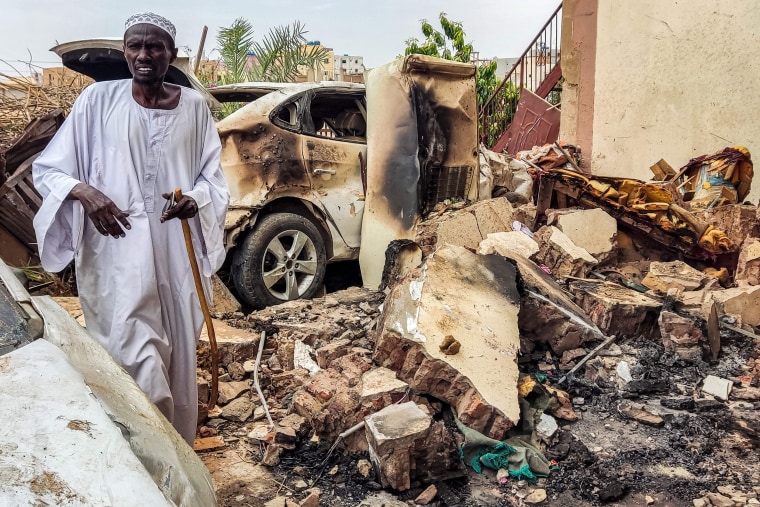 A man inspects damage as he walks through the rubble by a destroyed car outside a house that was hit by an artillery shell in southern Khartoum in June.AFP via Getty Images
A man inspects damage as he walks through the rubble by a destroyed car outside a house that was hit by an artillery shell in southern Khartoum in June.AFP via Getty Images
The current war has triggered waves of ethnic killing in Darfur. Reuters has chronicled the violence there, which was spearheaded by the RSF and its allied militias. In a series of reports, the news agency exposed how the war unleashed a lethal, racially charged campaign against the Masalit people of West Darfur.
The RSF evolved from militias that were used to crush an insurgency that flared in Darfur in the early 2000s. By 2008, an estimated 300,000 people had died in the violence, many from starvation.
So far, the war in Sudan has killed more than 14,000 people, according to U.N. estimates, and driven more than eight million from their homes, making Sudan the world’s largest displacement crisis.
‘A death sentence’
Before the conflict, Khartoum had been almost entirely untouched by the fighting that ravaged Darfur. But people in many areas of the capital now find themselves caught in a war zone between the army and the RSF.
Across the Nile from Al Fiteihab, some 2,800 people are trapped in areas around the Sudanese army’s base in Al Shajarah neighborhood in Khartoum, according to two volunteers who escaped the area at the end of last year.
One of the volunteers, Gihad Salaheldin, said that after running out of food, men began sneaking out under cover of nightfall to search for supplies. Residents have also been drinking untreated water from the Nile, volunteers said.
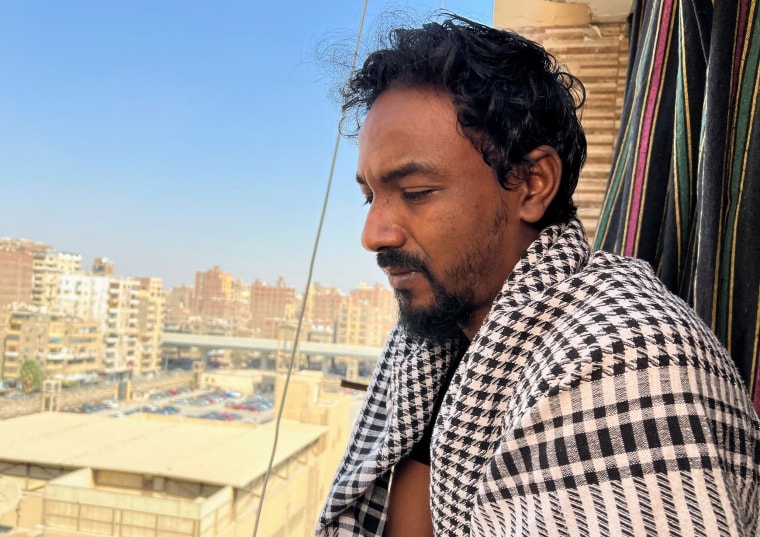 Gihad Salaheldin said that after running out of food, men began sneaking out under cover of nightfall to search for supplies.Sayed Sheashaa / Reuters
Gihad Salaheldin said that after running out of food, men began sneaking out under cover of nightfall to search for supplies.Sayed Sheashaa / Reuters
Across the capital, the communications blackout forced communal kitchens to suspend operations because they could no longer receive donations sent via a mobile banking app. The emergency response rooms in Khartoum state said Sunday that they had been forced to shut 221 of these kitchens because of the blackout.
Recently, donations have started to trickle in again as volunteers sporadically gain access to the internet using billionaire Elon Musk’s Starlink system in some places.
But little international aid is getting into Sudan as humanitarian agencies struggle to get the necessary entry and transport permits from authorities. The United States and the European Union have criticized both the army and the RSF for the breakdown in aid distribution.
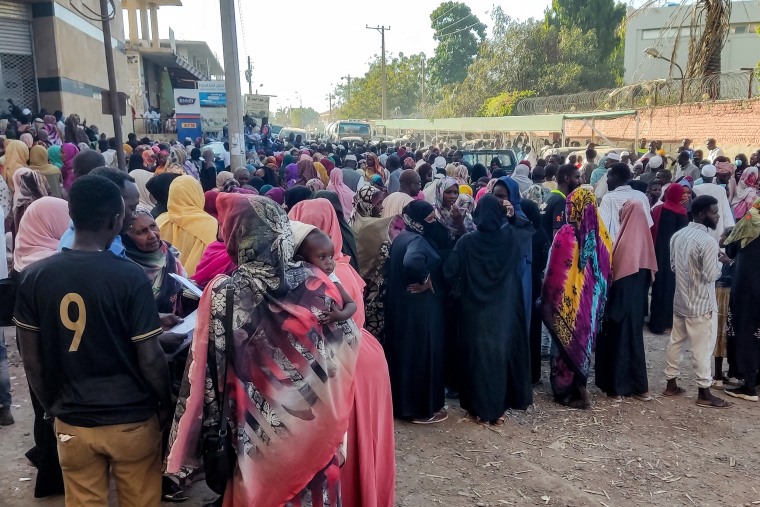 Displaced people line up to receive aid from a charity organization in Gedaref, in December.AFP via Getty Images
Displaced people line up to receive aid from a charity organization in Gedaref, in December.AFP via Getty Images
Swaths of Darfur haven’t received aid since before the war began, according to residents and aid agencies. After previously blocking the entry of aid from Chad into Darfur, a U.N. official said Tuesday on X that the Sudanese authorities had agreed to the transfer of aid through a border crossing into North Darfur.
Addressing RSF appeals for agencies to deliver aid to areas under its control, army commander Gen. Abdel Fattah al-Burhan said in February: “This will not happen until we end this war and defeat these criminal rebels.”
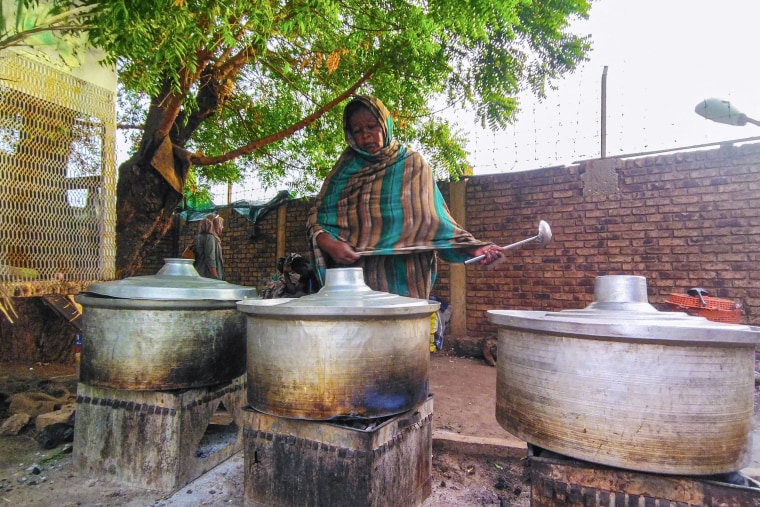 A charity kitchen providing food for the displaced at a camp in Wad Madani, the capital of Sudan’s al-Jazirah state, in June.AFP via Getty Images
A charity kitchen providing food for the displaced at a camp in Wad Madani, the capital of Sudan’s al-Jazirah state, in June.AFP via Getty Images
The Sudanese Foreign Ministry, which is aligned with the army, has accused the RSF of plundering and blocking aid, as have some aid agencies. The RSF has denied looting and has said any rogue actors in its ranks will be held responsible.
An assessment by Doctors Without Borders in January found that in North Darfur’s Zamzam displacement camp, home to some 400,000 people, an estimated one child is dying every two hours. Almost 40% of children ages, six months to 2 years old, were malnourished, the group found.
If aid didn’t reach Darfur soon, it would be “a death sentence for millions in desperate need,” the Norwegian Refugee Council’s Jan Egeland said.
In South Darfur’s Kalma camp, home to hundreds of thousands of displaced people, adults are struggling to survive on a gruel of sorghum flour and water, while malnourished children are getting infections and malaria, according to aid workers and residents.
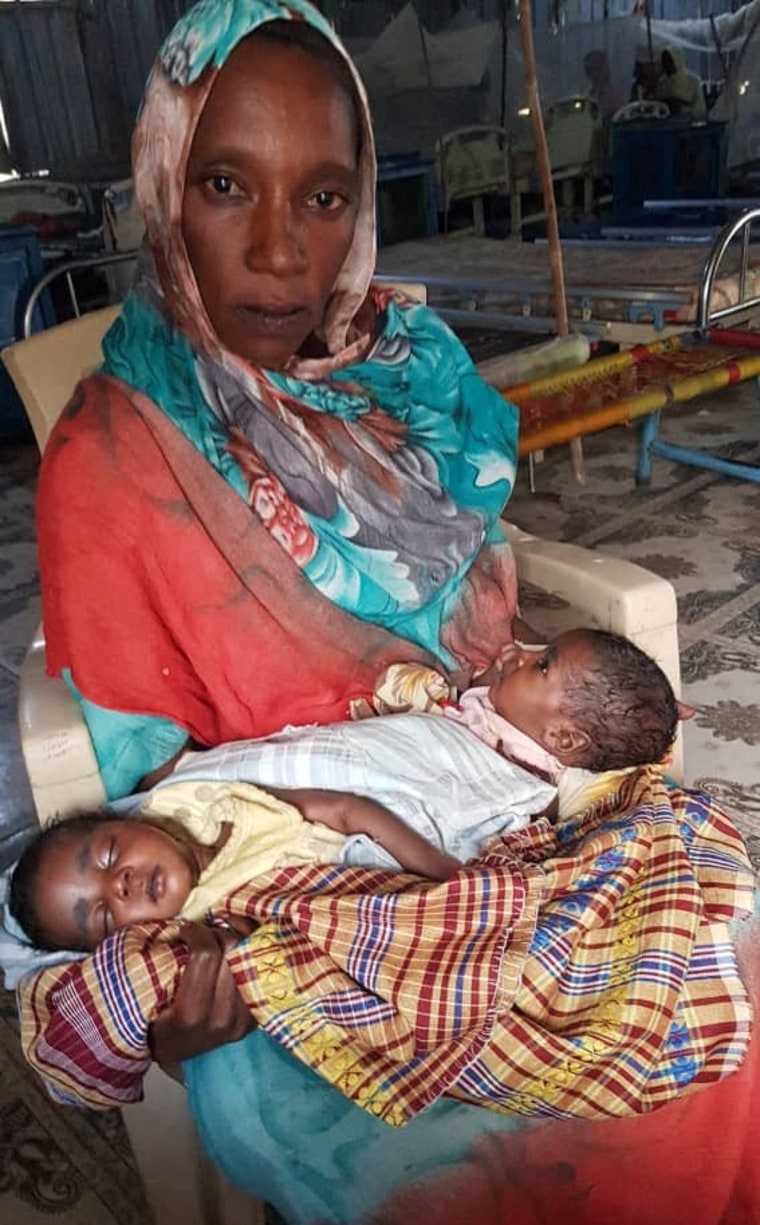 Fatma Ibrahim’s twin babies, Jana and Janat, are being treated for severe malnourishment.Handout via Reuters
Fatma Ibrahim’s twin babies, Jana and Janat, are being treated for severe malnourishment.Handout via Reuters
Mohammed Omar, a resident of Kalma, said that he and his family have been displaced four times since the war began. He receives one meal a day — a dumpling made of sorghum flour and water that would normally be eaten with a meat stew. “There is not a day we don’t go to the cemetery to bury people,” he said.
Fatma Ibrahim was pregnant with twins as the fighting spread last year. She said that after giving birth in December, she was unable to afford baby formula and couldn’t breastfeed because she lacked enough to eat.
Her twin girls, Jana and Janat — Arabic for heaven and heavens — quickly became malnourished and were admitted to a medical center in Kalma.
Ibrahim, 27, spoke via WhatsApp from the medical center. “There is no money, no food, no milk,” she said. “There is nothing.”
>>> Read full article>>>
Copyright for syndicated content belongs to the linked Source : NBC News – https://www.nbcnews.com/news/world/sudan-famine-millions-hungry-civil-war-army-rapid-support-forces-rcna141996










